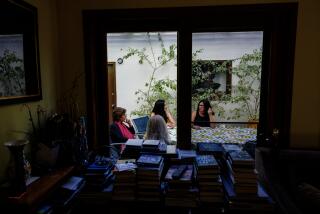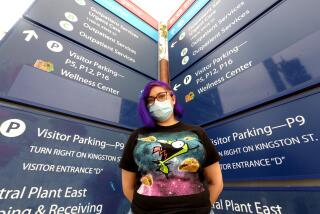Free Clinic--New Setting, Same Mission : Health care: The nation’s oldest no-cost health clinic will move into a $2.3-million facility on Beverly Boulevard. But it is still committed to serving those on the economic fringes of society.
- Share via
Working in blue jeans and T-shirts in cramped examination rooms in a dowdy brick building, volunteers of the fabled Los Angeles Free Clinic for two decades took pride in the scruffy, down-to-earth feel of the place.
What better way to encourage tattered street people and hippie nomads to seek health care than to throw off the lab coats, shrug off formalities and pipe in rock music of the Love Generation and beyond?
But when the Free Clinic moves today into new $2.3-million quarters three times the size of its old building, the homely atmosphere of the nation’s oldest no-cost health clinic will have headed decidedly uptown. Three stories tall, with a glassed-in atrium and walls painted hues of purple heather, the new clinic will have bathrooms larger than its old examination rooms.
The new Beverly Boulevard facility will be outfitted with decorator-colored dental chairs, an elevator, a board room and a host of expanded facilities that reflect the health care demands of the times--a larger diagnostic laboratory with AIDS testing equipment, a shower for the homeless, nine counseling rooms.
Nearly 1 million clients after it opened in 1967 on Fairfax Avenue to help waves of flower children deal with bad drug trips, venereal disease, and birth control, the Free Clinic’s mission to offer short-term health care to people on the economic fringes of society has not changed.
“We will still be very open and accepting,” said Mimi West, president of Friends of the Los Angeles Free Clinic, a fund-raising organization. “We will still serve all parts of the population that have been cut off from health care.”
What has changed is the clientele. The long lines of barefoot free-spirits--whose care was funded by donations that included a $10,000 gift from Elvis Presley--have given way to those in more desperate need. The Free Clinic now caters primarily to homeless people, runaway youths, minimum-wage workers, prostitutes and non-English-speaking clients.
“The hippies lived their life styles by choice, coming to us when they ran into difficulties,” said Gary Bess, the Free Clinic’s executive director. “But now we are seeing increasing numbers of throwaway kids, homeless and victims of domestic violence, none of whom have chosen their situations. We are also seeing a lot of working poor who simply can’t afford health care.”
The new facilities will allow the clinic to increase by half the number of patients it sees, but with demand for free health care at an all-time high, clinic volunteers still expect an overflow of clients. Between 1985 and 1987, the last year the clinic operated in a single location, the annual patient load jumped from 19,843 to 22,600.
“Unfortunately, the building is already too small,” Bess said, estimating that the clinic will have to continue turning at least one person away for every person served. Even as plans are under way for the new building’s grand-opening celebration, the Free Clinic’s board of directors is seeking a Hollywood site for its first branch office.
A list of the concerns addressed by the clinic’s programs reads like an encyclopedia of modern social ills: AIDS, teen-age pregnancy, mentally ill homeless people, battered spouses and malnourished runaways.
The clinic moved to the Beverly Boulevard site in 1975, after outgrowing its first modest home on Fairfax Avenue. Since 1988, when the existing building was bulldozed and construction began on the new building, the clinic has operated out of donated quarters in several local outpatient facilities.
Early volunteers at the clinic were mostly caring peers with little medical or counseling education. But since it has developed a reputation as a national model for such programs, the Free Clinic now draws established professionals and graduate medical students who need experience. All the physicians, nurses and technicians who work at the clinic are professionals who volunteer their time.
Full of the optimism that has kept the nation’s oldest free clinic in business, supporters say the added space and facilities will bring in even more volunteers--already there are more than 400. “We’ll have more than the thousand points of light right here in the building,” West said. “The volunteers who love and know the clinic will maintain the looseness.”
Expanded services that the clinic has added over the years include legal and psychological counseling, treatment for victims of domestic abuse and AIDS education. Because of a flurry of agencies now specializing in drug counseling, the clinic refers most drug problems to specialists.
New needs appear every year, and the Free Clinic has prided itself on its quick adaptability. In fiscal year 1988-89, for example, volunteers saw 771 people for acquired immune deficiency syndrome testing and counseling. Increasingly, the clinic has offered ongoing mental health counseling to homeless people, legal services to victims of domestic violence and financial counseling for AIDS patients who have exhausted their bank accounts fighting the disease.
“This agency by nature is evolutionary. Even while building the new clinic, we have suddenly had to run around and find out where to put new things,” such as a shower for homeless people, said Joel Schwartz, president of the clinic’s Board of Directors.
The new Free Clinic has seven examination rooms, nine counseling rooms and a separate area for dental care. It has an expanded diagnostic laboratory to test urine and blood, more and larger bathrooms and parking for volunteers.
In contrast, photographs that volunteers saved of the old building show a resourceful use of cramped space: Technicians performed tests in a lab the size of a large broom closet, and tables in tiny examination rooms were hemmed in by sinks and instrument trays.
Though the new building looks like a New Age, upscale physician’s office, supporters say the tenets of the original, ragtag Free Clinic will remain intact. Confidentiality, and even anonymity where AIDS is concerned, will still be the law of the clinic.
“Part of our whole philosophy is that we are non-judgmental: You can come in a three-piece suit or holey jeans, and it does not matter,” said West.
The clinic now draws much of its financial support from past clients, more than a few of them former bead-strung hippies who now have established careers, West said. The $2.3 million needed to build the new clinic was raised entirely from private sources, she said.
The Free Clinic has also received the attention of numerous celebrities and politicians over the years. Sen. Edward M. Kennedy (D-Mass.) is slated to appear at the clinic’s “grand reopening” ceremony in April, and Los Angeles Mayor Tom Bradley has made annual contributions since he first toured the clinic as a councilman in 1971.
More to Read
Sign up for Essential California
The most important California stories and recommendations in your inbox every morning.
You may occasionally receive promotional content from the Los Angeles Times.









